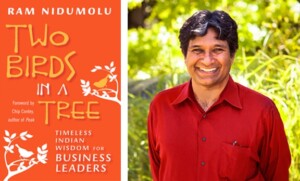India and the world are frantically searching for a new mantra to transcend from the quagmire of inequality and filth they have got themselves into. Experiment with Conscious Capitalism as an alternative to socialism and communism has shown limited and slow results. Dr. Ram Nidumolu shows how the ancient India-inspired Dharma Capitalism could be the model the world has been searching for to construct an inclusive and sustainable growth story
India urgently needs a model for economic, societal and cultural growth that is suited to its context. Such a model of all-round growth can provide us a shared vision of a flourishing future where our enormous potential as a country can be realized.
Throughout our history, we have successfully renewed ourselves by learning from others while preserving the core of our ancient heritage. Can we do this again now in the 21st century as we (and the world) face an uncertain future?
In my earlier book on ancient Indian wisdom and business (“Two Birds in a Tree: Timeless Indian Wisdom for Business Leaders” HarperCollins India, 2013), I argued that this preservation and renewal is indeed possible through dharma capitalism. The economic juggernaut that Western capitalism has become in the last 250 years can be repurposed and guided toward the greater good by the 2500-year old Indian concept of dharma, which essentially means a harmonious balance or order. Its central importance to han activity originated in and has been nourished by the variety of religions that have thrived in India over the millennia.
Dharma capitalism relies on the core features of free-market capitalism, i.e., the private ownership of wealth and the importance of markets, to enable economic efficiency. But it recognizes that fairness also matters greatly and needs to be balanced with efficiency. Fairness among different groups in society leads to reduced inequality, while fairness among generations and between humanity and nature leads to sustainability.
In dharma capitalism, this balance is consciously cultivated at the individual level by enabling these values in each of us. By contrast, state capitalism (found especially in the Chinese model) seeks to ensure this balance through state-owned enterprises and policies, which often create cesspools of corruption. A core tenet of dharma capitalism is therefore the cultivation of an inner moral compass that a sense of dharma provides. If these internalities are strengthened, then the externalities of capitalism (such as environmental degradation and societal inequality) are mitigated.
Dharma capitalism therefore emphasizes an inner moral compass to achieve a harmonious balance among the different forms of capital, such as financial, physical, human, social, and natural capital.
Being Capital
But where does this inner compass come from and how does it reveal itself? Ancient Indian wisdom provides a clear direction because the many religions that have thrived on its soil have been consistent in their answer. It can be cultivated when we look beyond the sense of separation that we each feel and recognize that we are deeply interconnected as living beings. In my book, I called this inner sense of larger being and interconnection that is emphasized by ancient Indian wisdom as being capital. It is the stock of inner resources that energizes a harmonious balance among the different forms of capital that need to be considered in an all-round model of sustainable growth.
As for how it reveals itself, individuals with high being capital also display high levels of integrity, care, inclusiveness, tolerance, self-awareness, long-term thinking, trust, and other healthyqualities in their everyday behaviors and interactions.
If being capital is the key means to dharma capitalism, then what are its main ends? Here again, we need to expand our sense of the ends of capitalism through a being-centered approach. Instead of GDP, economic growth, revenues and profits, we need to think in terms of the overall wellbeing of India, its institutions and its citizens. Instead of aspiring to become an economically rich society, we need to aspire to become a more beingful society that is rich in wellbeing because individuals are rich in their connections to other human and living beings and there is a harmonious balance between the different kinds of capital.
Such a kind of balance, capitalism, and society may seem unattainable and even quixotic in aspiration. In their defense, they are at least more sustainable (and no more unattainable) than the perfect efficiency, free market capitalism, and continually growing economies that are at the heart of conventional economic theories. In addition, ancient Indian heritage also shares this common feature among its many religions and cultures – the goals encouraged by them often seem unattainable, whether it is dharma, moksha (liberation), nonviolence, the pursuit of Truth, or union with God. Nevertheless, these higher aspirations have continued to animate the peoples of our different cultures and religions through the tumult of the centuries.
Capitalism needs such a higher purpose as a guide, if it wants to avoid the fate of its cousins such as
socialism and communism that are littering the dustbins of histories around the globe. Dharma capitalism
can provide this animating vision to drive our models of a sustainable future.
Dr. Nidumolu CEO, Innovastrat, Inc.
ram@innovastrat.com











